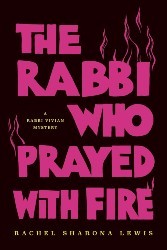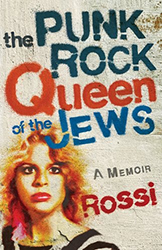This Rabbi Vivian Mystery is set six years after the first book in Rachel Sharona Lewis’s series. Rabbi Vivian Green is preparing to take over as head rabbi of her synagogue. She and her wife contemplate taking steps toward having a child, and her predecessor, Rabbi Joseph, plans to make aliyah upon retirement. Meanwhile, a friend of Vivian’s wife struggles with the moral implications of military investment in his work in robotics and AI, and a Category 4 hurricane threatens the city of Providence. This installment in the series centers on a trio of major contemporary issues: climate change, artificial intelligence, and the growing tension within the American Jewish community over Israel’s fragile democracy. Some small differences from reality, such as a change in hurricane-naming guidelines, suggest a near-future setting.
Readers looking for a complex mystery with many clues and red herrings to puzzle over may find the plot — involving the disappearance of an autonomous military robot — too straightforward. The mystery is less deeply connected to Vivian’s story than the synagogue fire of the first book, and at times feels like an afterthought. The part of the plot in which the synagogue is used as a storm shelter is much stronger, and feels more lovingly drawn. The most compelling element of the robot mystery is its spin on the legend of the golem. The echoes of the golem story in the autonomous, AI-driven security unit tie nicely into Rabbi Vivian and Rabbi Joseph’s conflict over the morality of the Israeli government (but perhaps could have been developed further).
The real strength of the novel is the way that Lewis’s protagonist explores the moral questions that progressive community leaders must face. Is it right to bring a child into a world of climate change and political upheaval? Are human efforts enough to repair what human negligence has allowed to break? How do Jewish communities and their leaders balance concern about antisemitism with the need for solidarity with other oppressed peoples, or concern about Israel with concern about the diaspora? Juxtaposing Sukkot (and its motifs of vulnerability to the elements) with a strong New England hurricane is a particularly clever way to join Jewish tradition and an urgent contemporary issue.
The Rabbi Who Prayed for the City is an excellent choice for Jewish book groups looking for a fun and engaging way to start a discussion about balancing tradition with innovation and internal Jewish concerns with community relations. Although dedicated readers of whodunits might find the story too simple, the characters are charming, and Lewis ties up loose ends neatly, while still leaving the larger philosophical questions for us to answer for ourselves.
Sacha Lamb (@sachalamb.author on Instagram) explores gender, sexuality, and disability through historical fiction centering Jewish mythology and folklore. Their debut, When the Angels Left the Old Country, is a Printz Honor book and Stonewall and Sydney Taylor award winner. Their second novel, The Forbidden Book, is a Sydney Taylor Honor book and a Boston Globe Best of the Year pick for 2024. A 2018 Lambda Literary fellow, Sacha has a degree in Library and Information Science from Simmons University. They live in New England with a miniature dachshund mix named Anzu Bean.




